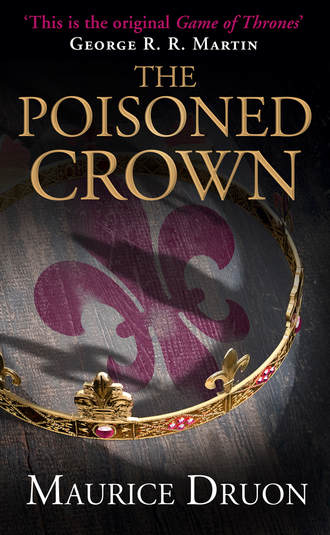
Полная версия
The Poisoned Crown
His hand on his dagger, his chin held high, Guccio looked at Naples deployed before him, as if he were about to buy it.
Ten galleys escorted the ship to the open sea; then the Neapolitans watched this white sea-fortress fade into the distance.
2
The Storm

A FEW DAYS LATER THE San Giovanni was no more than a half-dismasted, tortured hulk, running before the squalls, tossed in huge seas, while the captain endeavoured to keep her afloat and make what he conceived to be the coast of France, though doubtful whether he would ever succeed in bringing his passengers safely into port.
The ship had been caught on the latitude of Corsica by one of those brief but devastating storms which, on occasion, ravage the Mediterranean. Six anchors had been lost in an endeavour to hold the ship to the wind off the coast of Elba, and she had barely escaped being wrecked upon the island’s rocky shore. They had managed to sail upon their course, but in a tremendous sea. A day, a night, and another day had been spent amid the hell of waters. Several sailors had been injured in taking in what remained of the sails. The crow’s nest had gone overboard with all the weight of stones destined for Barbary pirates. The saloon hatch had had to be forced open with axes in order to free the Neapolitan gentlemen imprisoned by the fall of the mainmast. The Princess’s chests of dresses, jewels, and plate, all her wedding presents, had been washed away. The surgeon-barber’s sick bay in the forecastle was crowded. The chaplain was even unable to celebrate the aride2 Mass because ciborium, chalice, books, and ornaments had been swept overboard by a wave. Clutching the rigging, crucifix in hand, he listened to the confessions of those who thought they were soon to die.
The magnetized needle was now utterly useless, since it bobbed wildly upon the residue of water left in the container in which it floated. The captain, an excitable Latin, had torn his robe open to the waist as a sign of despair and was heard to cry, between a couple of orders: ‘Lord, come to my help!’ Nevertheless, he seemed to know his business well enough and to be doing his best to extricate them from their difficulties; he had had the oars shipped. They were so long and heavy that seven men were needed to work each one of them. And he had summoned a dozen sailors to control the helm, six on each side.
Nevertheless, Bouville had been furious with him at the beginning of the storm.
‘Well, Master Mariner, is this the kind of shaking you give a Princess engaged to the King my master?’ the ex-Grand Chamberlain had cried. ‘Your ship must be badly loaded to roll like this. You know nothing of navigation or how to make use of favourable currents. If you do not quickly do better, I shall upon arrival have you haled before the justices of the King of France and you’ll learn seamanship on a galley’s bench.’
But his anger had quickly evaporated, since for the next eight hours he had been sick upon the oriental carpets, in company, moreover, with the majority of the suite. His head rolling upon his shoulders, his face pale, his hair, coat, and hose drenched, the unhappy man prepared to give up the ghost every time a wave lifted the ship, groaning between a couple of hiccups that he would never see his family again and that, during the whole of his life, he had not committed sufficient sins to deserve this intensity of suffering.
Guccio, on the other hand, showed remarkable courage. Clear of head and light of foot, he had taken the precaution of carefully lashing his money-chest and, during moments of relative calm, ran through the spray in search of drinking-water for the Princess, or sprayed scent about her in order to overcome the stench of her seasick companions.
There are certain sorts of men, particularly very young ones, who instinctively behave in the manner expected of them. If they are looked upon with contempt, there is every likelihood of their behaving in a contemptible way. On the other hand, if they feel that people esteem them and have confidence in them, they can surpass themselves and, though as frightened as the next man, can conduct themselves like heroes. Guccio Baglioni was to some extent of this breed. Because Princess Clémence had a way of behaving towards people, whether rich or poor, nobleman or commoner, which maintained their self-respect, because she also used the young man with particular courtesy, since he had been to some extent the harbinger of her good fortune, Guccio, in her company, felt himself to be a knight and behaved with more spirit than any of her gentlemen.
He was a Tuscan and therefore capable of daring all in order to shine in female eyes. And yet, at the same time, he remained body and soul a banker and gambled with fate as one gambles on the exchange.
‘Danger presents the best opportunity of becoming intimate with the great,’ he said to himself. ‘If we’ve got to founder and perish our fate will certainly not be changed by lapsing into lamentation like poor Bouville. But, if we escape I shall have acquired the esteem of the Queen of France.’ To be able to think thus at such a moment was in itself evidence of considerable courage.
But Guccio, that summer, believed himself invincible; he was in love and assured of being loved in return. His head stuffed with heroic tales – for dreams, plans, and ambitions were still chaotically mingled in the boy’s mind – Guccio knew that those engaged in adventure always came out safely in the end if a beautiful damsel is awaiting them in a castle! His was at the Manor of Cressay.
He therefore assured the Princess Clémence, against all the evidence, that the weather was improving, asserted that the ship was sound when it was in fact being strained to the limit, and drew comparisons with the much more terrifying storm, or so he pretended it had been, that he had experienced the previous year when crossing the Channel and from which he had issued safely.
‘I was on my way to Queen Isabella of England with a message from Monseigneur Robert of Artois.’
Princess Clémence was also behaving in exemplary fashion. Lodged in the stern cabin, a state apartment arranged for royal passengers in the stern-castle, she was endeavouring to calm her ladies who, like a flock of frightened sheep, moaned at every wave.
Clémence had uttered no single word of regret when she was told that her chests of dresses and jewels had gone overboard.
‘I would have given twice as much,’ she merely said, ‘if it could have saved the poor sailors from being injured by the mast.’
She was less afraid of the storm than of the augury she saw in it.
This marriage was more than I deserved,’ she thought; ‘I have been too happy in the thought of it and have sinned from pride; God will shipwreck me because I do not deserve to become a queen.’
Upon the third morning, when the ship was in a temporary lull, though the sea gave no sign of abating nor the sun of appearing, fat Bouville, his feet bare, dishevelled, wearing only a shirt, was discovered kneeling on the deck with his arms crossed.
‘What on earth are you doing there, Messire?’ asked Princess Clémence.
‘I’m doing what Monsieur Saint Louis did, Madam, when he was nearly drowned off Cyprus. He promised to give a silver ship weighing five marcs3 to Monsieur Saint Nicolas de Warangeville, if God would bring him safely back to France. It was Messire de Joinville who told me the story.’
‘I join you in your vow, Bouville,’ replied Clémence, ‘and since our ship is under the protection of Saint John the Baptist, I promise, if we survive and I am mercifully permitted to give the King of France a son, to call him John.’
She at once knelt down and began praying.
Towards midday the violence of the sea began to decline and everyone became more hopeful. Then the sun burst through the clouds; land was sighted. The captain joyfully recognized the coast of Provence and, as they drew nearer, the calanques of Cassis. He was extremely proud of having kept to his course.
‘You will land us here upon the coast at once, I presume, Master Mariner,’ cried Bouville.
‘I must take you to Marseilles, Messire,’ replied the captain, ‘and we are not far from it. In any case I no longer have sufficient anchors to lie off those cliffs.’
A little before evening the San Giovanni, under oars, was lying off the port of Marseilles. A boat was sent off to warn the city authorities to lower the heavy chain which protected the entrance to the harbour between the Malbert tower and Fort Saint-Nicolas. The Governor, the sheriff, and magistrates (Marseilles was at that time an Angevin city) came off in a strong mistral to welcome the niece of their suzerain lord, the King of Naples.
Upon the quay labourers from the salt-pans, fishermen, makers of oars and rigging, caulkers, money-changers, merchants from the ghetto, clerks from the Genoese and Siennese banks, gaped in astonishment at the huge ship, now a sail-less, dismasted wreck, as the sailors danced and embraced each other on the deck, crying that a miracle had occurred.
The Neapolitan gentlemen and the ladies of the suite endeavoured to put some order in their dress.
Brave Bouville, who had lost a stone during the voyage and whose clothes now hung loose upon him, continually assured those about him that it had been his idea to make a vow and that it was this which had prevented their being shipwrecked, that everyone, in fact, owed their life to him.
‘Messire Hugues,’ Guccio replied with an ironic gleam in his eye, ‘there never has been a storm, from what I hear, in which someone has not made a vow similar to yours. How then do you explain the fact that so many ships manage to go to the bottom all the same?’
‘It must be because they have a miscreant like you on board!’ replied the ex-Chamberlain with a smile.
Guccio was the first to jump ashore. He leaped lightly from the shrouds in order to prove how vigorous he was. There was a rending cry. After several days upon a pitching deck, Guccio had miscalculated the earth’s stability; his foot had slipped and he had fallen into the sea. He barely escaped being crushed between the stone quay and the ship’s hull. The sea around him at once turned red; in his fall he had torn himself on an iron hook. He was pulled out in a half-fainting condition, bleeding, his thigh cut to the bone. He was immediately taken to the Hôtel-Dieu.
3
The Hôtel-Dieu

THE HUGE WARD FOR men was like a cathedral nave. At the end of it was an altar where four masses, vespers, and evensong were celebrated every day. The privileged patients occupied little cells, called ‘rooms of consideration’, which lined the walls; the rest were lying two in a bed and head to foot. The monks, in long brown habits, were continuously passing up and down the centre aisle, either to sing the office, to attend to the sick or serve the meals. Religious exercises were intimately related to medical treatment; the groans of the sufferers were mingled with verses of the psalms; the odour of incense could not overcome the atrocious smell of fever and gangrene; death was a public spectacle. Inscriptions, painted in high gothic letters upon the walls, prepared the patient for death rather than recovery.4
For three weeks Guccio had lain there in a cell, gasping for breath in the appalling heat of summer, which always has a tendency to make illness more exhausting and hospitals more disagreeable. He looked sadly at the rays of the sun which entered by the windows pierced high in the wall and threw large golden patches upon this assembly of human desolation. He could make no movement without groaning; the balms and elixirs of the nursing brothers burnt him like so many flames, and every dressing was a time of torture. No one seemed to be able to tell him whether the bone was affected; but he felt sure that the wound was more than a flesh-wound, since he nearly fainted whenever they touched his thigh or the small of his back. The doctors and surgeons assured him that he was in no mortal danger, that at his age one recovered from anything, and that God had performed many another miracle, as He had for that caulker’s boy who had come in the other day, carrying his intestines in his hands, and who had left after a short time even gayer than before. Guccio despaired none the less. He had been there three weeks already and there seemed no reason to suppose he would not be there for another three, or even three months, or that he would not be lame and crippled for ever.
He saw himself condemned for the rest of his life to crouching huddled behind a money-changer’s counter in Marseilles because he could not make the journey to Paris. If, that was, he died from no other disease. Every morning he saw one or two corpses carried out. They had already turned a horrible black colour, since there were always, as in every Mediterranean port, a few cases of plague about. And all this because he had wished to show off by jumping on to the quay before his companions. And when he had just escaped shipwreck too!
He was furious at fate and his own stupidity. He sent for the letter-writer almost every day and dictated to him long letters for Marie de Cressay which he sent by the couriers of the Lombard banks to the branch at Neauphle, so that the chief clerk might give them secretly to the girl.
With all the emphasis and richness of image which Italians use in speaking of love, Guccio sent the most passionate declarations. He assured her he only wished to get well for her sake, for the happiness of seeing her again, looking upon her, and cherishing her day by day for ever. He besought her to be faithful to the pact they had sworn, and promised her enduring happiness. ‘You dominate my whole heart, as no one else will ever do, and if you should fail me, my life too would fail.’
Now that he was confined through his own stupidity to a bed in the Hôtel-Dieu, he was presumptuous enough to begin to doubt everyone and everything and to fear that the girl he loved was no longer waiting for him. Marie would grow tired of an absent lover, would fall for some young provincial squire, a huntsman and champion in tournaments.
‘My good luck,’ he said to himself, ‘was to have been the first to love her. But now it is a year and soon will be eighteen months since we kissed each other for the first time. She will reconsider the matter. My uncle warned me. What am I in the sight of a daughter of a noble house? A Lombard, that is to say a little more than a Jew, a little less than a Christian, and most certainly not a man of rank.’
As he contemplated his wasted, motionless legs, wondering whether he would ever be able to stand upon them again, he described in his letters to Marie de Cressay the wonderful life he would give her. He had become the friend and protégé of the new Queen of France. To read his letters one might have thought that it was he alone who had negotiated the King’s marriage. He told of his embassy to Naples, the storm, and how he had behaved in it, relating the courage of the crew. He attributed his accident to a chivalrous design; he had leapt forward to assist Princess Clémence and to save her from falling into the sea, when she was on the point of leaving the ship, which was, even in harbour, still tossed by waves.
Guccio had also written to his uncle Spinello Tolomei describing his misfortune, begging that the Neauphle branch be kept for him and asking for a credit with their Marseilles correspondent.
He had a number of visitors who distracted his mind a little and gave him a chance of complaining in company, which is more satisfying than complaining to oneself. The representative of the Tolomei Bank was assiduous in his attentions and arranged for better food than that supplied by the hospital brothers.
One afternoon Guccio had had the pleasure of seeing his friend Signor Boccaccio di Cellino, senior traveller of the Bardi company, who happened to be passing through Marseilles. Guccio had been able to unburden himself to him as much as he pleased.
‘Think of all I’ll miss,’ Guccio said. ‘I shall not be able to attend Donna Clemenza’s wedding, where I would have taken my place among the great lords. Having done so much to bring it about, it really is bad luck not being able to be there! And I shall also miss the coronation at Rheims. It’s really quite intolerable. And I’ve had no reply from my darling Marie.’
Boccaccio did his best to console him. Neauphle was not a suburb of Marseilles, and Guccio’s letters were not carried by royal couriers. They had to go by the usual Lombard stages, Avignon, Lyons, Troyes, and Paris; the couriers did not leave every day.
‘Boccacino, my dear friend,’ cried Guccio, ‘since you’re going to Paris, I beseech you, if you have the time, go to Neauphle and see Marie. Tell her all I’ve said! Find out if my letters have reached her safely; try and discover whether she still loves me. Don’t hide the truth from me, even if it’s unpalatable. Don’t you think, Boccacino, that I might travel in a litter?’
‘What, so that your wound can reopen, worms get into it, and that you may die of fever in some filthy inn upon the road? What an idea! Are you mad? Really, Guccio, you’re twenty now, after all.’
‘Not yet!’
‘All the more reason for staying where you are; what’s a month here or there at your age?’
‘If it happened to be the operative month, my whole life might be ruined.’
Princess Clémence sent one of her gentlemen every day to ask news of the invalid. Fat Bouville came three times himself to sit beside the young Italian’s bed. Bouville was overwhelmed with work and anxiety. He was doing his best to get the future Queen’s attendants properly fitted out before setting forth on the road to Paris. Exhausted by the voyage, some of the company had had to retire to bed. No one had any clothes but the soaked and spoiled garments they had been wearing when they disembarked. The gentlemen and ladies of the suite were placing orders with tailors and dressmakers without worrying about payment. The whole of the Princess’s trousseau, which had been lost at sea, was to be made again; silver, china, trunks, all the necessities of the road, which at the period formed the normal equipment for a royal personage’s journey, had to be bought again. Bouville had sent to Paris for funds; Paris had replied that Naples should be approached, since the loss had taken place during that part of the journey which was in the territorial waters of the Crown of Sicily. The Lombards had had to be brought into play. Tolomei had remitted the demands to the Bardis, the usual money-lenders of King Robert of Naples; which explained Signor Boccaccio’s short stay in Marseilles, since he was on his way to arrange matters. In these chaotic circumstances Bouville much missed Guccio’s assistance, and when the ex-Chamberlain came to visit him, it was more to complain of his own lot and to ask the young man’s advice than to bring him comfort. Bouville had a way of looking at Guccio which seemed to imply: ‘Really, how could you do this to me!’
‘When are you leaving?’ Guccio asked him, looking forward to the moment with despair.
‘Oh, my poor friend, not before the middle of July.’
‘Perhaps by then I shall be well.’
‘I hope so. Do your best; your being well again would be a great help to me.’
But the middle of July came without Guccio being up on his feet, far from it indeed. The day before her departure, Clémence of Hungary insisted upon saying goodbye to the sick man herself. Guccio was already much envied by his companions in the hospital for the number of visitors who came to see him, the solicitude with which he was surrounded, and the ease with which his demands were satisfied. He became an almost legendary and heroic figure when the fiancée of the King of France, accompanied by two ladies-in-waiting and six Neapolitan gentlemen, strode in through the doors of the great ward of the Hôtel-Dieu. The brothers, who were singing vespers, looked at each other in astonishment, and their voices turned a little hoarse. The beautiful Princess knelt down, like the most humble of the faithful, and then, when the prayers were over, advanced down between the beds, through the long expanse of suffering, followed by a hundred pairs of astonished eyes.
‘Oh, poor people,’ she murmured.
She immediately ordered her following to give alms in her name to every patient, and that two hundred pounds should be given to the foundation.
‘But, Madam,’ Bouville, who was walking beside her, whispered, ‘we haven’t enough money to pay with.’
‘What does that matter? It’s better than buying chased drinking-cups or silks for dresses. I feel ashamed of such vanities; I even feel ashamed of my own health when I see so much misery.’
She brought Guccio a little reliquary which enclosed a minute piece of Saint John’s robe ‘with a visible stain of the Baptist’s blood’ which she had bought at a great price from a Jew who specialized in this particular business. The reliquary was suspended from a little gold chain which Guccio immediately hung round his neck.
‘Oh, dear Signor Guccio,’ said Princess Clémence. ‘I am so sorry to see you lying here. You have twice made a long journey so as to be, with Messire de Bouville, the messenger of good tidings; you were of great assistance to me at sea, and now you will not be present at the celebration of my wedding!’
The ward felt as hot as an oven. Outside a thunderstorm threatened. The Princess took a handkerchief from her bag and wiped away the sweat which shone upon the invalid’s face with so natural and gentle a gesture that Guccio’s eyes filled with tears.
‘But how did this happen to you?’ Clémence went on. ‘I saw nothing at the time and, indeed, do not yet know what occurred.’
‘I ... I thought, Madam, that you were about to disembark, and as the ship was still rolling, I ... I leapt forward wishing to give you my arm for support. It was growing dark and the light was bad and, there it is, my foot slipped.’
From then on he had to believe in the half-lie himself. He would so like it to have happened like that! And, after all, the sudden whim which had made him want to jump ashore first ...
‘Dear Signor Guccio,’ said Clémence, much moved. ‘I do hope you get well quickly. And come and tell me of it at the Court of France; my door will always be open to you as a friend.’
They gazed into each other’s eyes but with perfect innocence, because she was the daughter of a King and he the son of a Lombard. Had the circumstances of their birth been different, this man and this woman might have fallen in love.
They were never to see each other again, and yet their destinies were to be more strangely and tragically linked than any two destinies have ever been.
4
Portents of Disaster

THE FINE WEATHER WAS short-lived. The tempests, gales, rain, and hailstorms which that summer devastated the west of Europe, and which Princess Clémence had already suffered on her voyage, began again the day after the cavalcade’s departure. After staging first at Aix-en-Provence and then at the Château d’Orgon, they arrived at Avignon in pouring rain. The painted leather hood of the litter in which the Princess was carried poured water like a cathedral gargoyle. Were the fine new clothes to be spoilt so quickly, the trunks flooded with rain, and the silver-embroidered saddles of the Neapolitan gentlemen destroyed before they had even been admired by the people of France? Messire de Bouville had caught cold, which did not make things easier. Could one imagine anything more absurd than to catch cold in the middle of July? The poor man was coughing, spitting, and snivelling in the most horrible way. As he grew older, his health was becoming more delicate, unless it were that the Rhône valley and the neighbourhood of Avignon were peculiarly unlucky for him.








